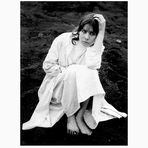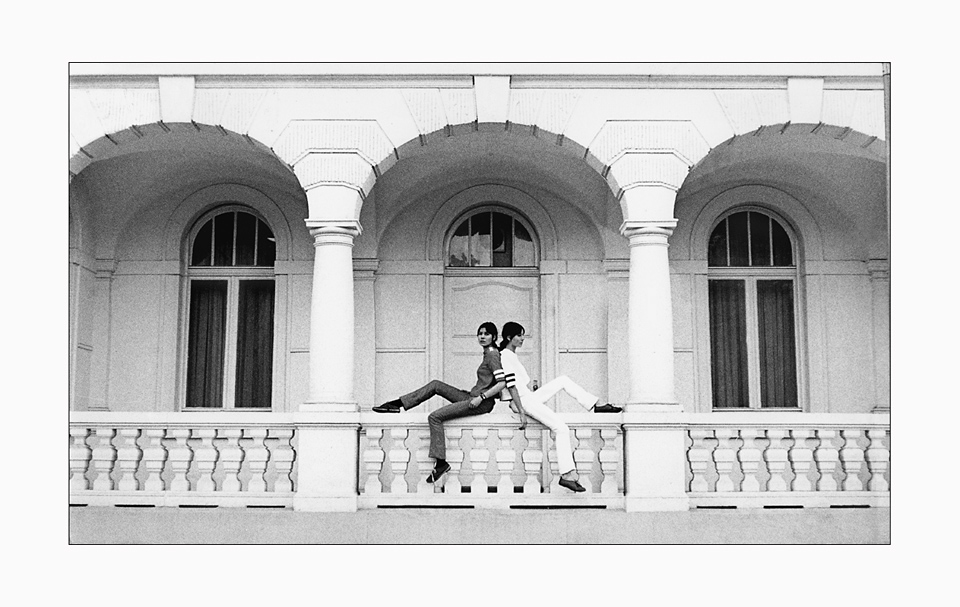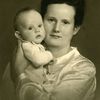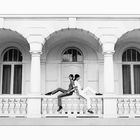Identical Twins. Gisela Getty and Jutta Winkelmann. Kassel 1967.

Gisela Getty. Kassel 1967.
† Klaus Baum

Jutta Winkelmann, die Zwillingsschwester von Gisela Getty. Kassel 1967.
† Klaus Baum
>>Holly Golightly, the so capricious and sad girl out of Truman Capote's "Breakfast at Tiffany's" could have been the inspiration for both of them: Jutta and Gisela, the twin sisters from Kassel who in the late 60's emerged to conquer the world.. Something of Andy Warhol's cult girls is inside of them and also even a bit of the German "Frauleinwunder". They desert their men and go to Rome. There they sample the Dulcea vita, as late flower children or as early punks. They meet the young millionaire heir Paul Getty III and become life's-play-companion with him. For them, this boy who resembles a Botticelli angel, represents the rich man which they had once imagined. The three of them developed scenarios on how to get fast money to pay for their drug consummation, for the great child-like dream of freedom, for the anarchical dream of happiness: How much would grandpa Getty pay for his kidnapped grandson? But the direction quickly derails for the young man and the two 'gold-diggers'. Getty's ear is cut off during the spectacular real kidnapping.
Langhans/Ritter have combined wonderful older material with recent interviews conducted with famous acquaintances of the twins. Mostly they try to explain the specialness of Jutta and Gisela's twin existence, although it appears as if they are really exploring what eternal femininity is.
The twins mostly play with each other and for the camera- and it's good this way. They are totally direct in their playfulness, very close to life. They sometimes make it clear how wonderful melodrama is in film and how terrible in real-life. The "girl" represents the incalculable in stability, the rebellion from the old fashioned, the game in life, the hope in all disappointment. The unity of opposites is mostly the key to Jutta and Gisela, how the smiling and the crying eye is fused into the mask of the there muse. And both of them are fighters , in this film they prove that Andy Warhol was right in the sixties, about the fifteen minutes of stardom.











florian 20. Oktober 2005, 0:37
wundervoll.Christian Fürst 9. Oktober 2005, 1:36
in der tat strahlt es eine gwissen Unschuld aus, wie man sie in einigen Szenen von "Blow-Up" aus jener Zeit auch kenntKathy Rett 8. Oktober 2005, 10:18
Dieses hier finde ich besonders gut. Ich habe mir mal alle Links angesehen. Wie interessant. Eine wirkliche Geschichte. Hast du noch mehr Links?HIer mag ich die Unterschiedlichkeit, die die beiden ausstrahlen, ohne ihre Gemeinsamkeit leugnen zu können oder zu wollen.
Mag ich sehr!
Gruß Kathy
Martina Cross 7. Oktober 2005, 9:07
absolut klasse! die info find ich auch super dazu! die grauwerte gefallen mir sehr, was mich aber ein ganz klein wenig stoert (und das auch nicht mal in diesem sinne) ist dass es ganz leicht nach rechts kippt.mein gott, jetzt hab ich mich in die reihe der "horizont noergler" eingereiht.........unglaublich.........;-))
lg aus schottland
m
Simon Greuter 7. Oktober 2005, 8:23
gefällt mir die symetrie.könnte aber noch minimal entzerrt werden.
lg, simon
† Klaus Baum 7. Oktober 2005, 1:01
@T. :In Kassel gab es zu der Zeit nur eine einzige Kneipe, die Treffpunkt für viele junge Leute war, Lohmann. Dieses Lokal befand sich auf einem Trümmergrundstück im Königstor. Lohmanns waren ein älteres Ehepaar, auch Oma und Opa Lohmann genannt, die den Jugendlichen das Zuhause boten, das sie Zuhause nicht fanden.
Bei Lohmann, um es auf den Punkt zu bringen, kannte nahezu jeder jeden.
Die Zeit bei Lohmann war eine Zeit relativer Unschuld, das heißt, wir, die wir dort verkehrten, hatten alle unsere Biographie noch vor uns.